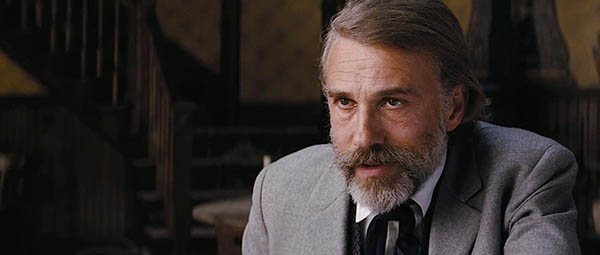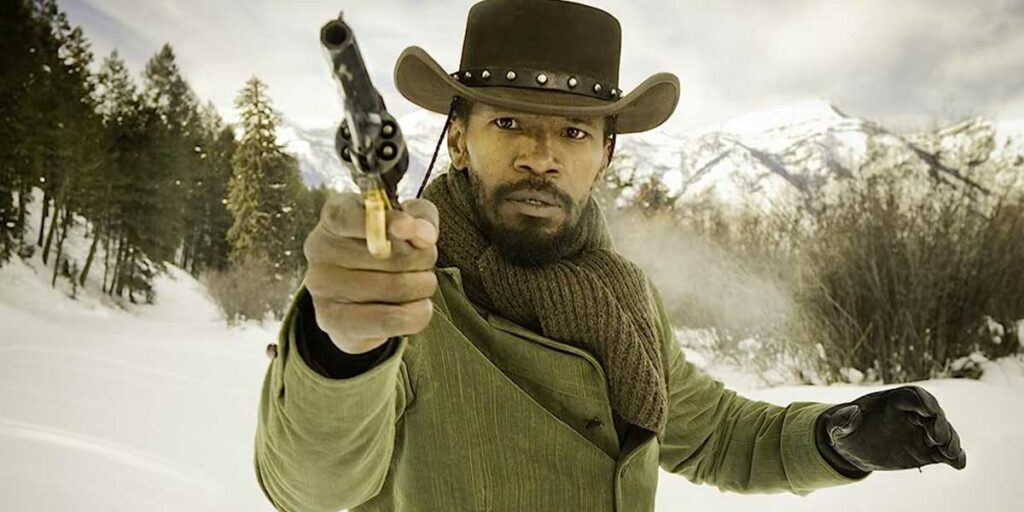A stupendous cast led by Jamie Foxx and Christoph Waltz and an exceptional script help make Django Unchained one of Quentin Tarantino’s best films.
When I first saw Django Unchained on Christmas Day 2012, I was in awe. At the time, I had seen a few westerns and approximately two films written and directed by Quentin Tarantino, Pulp Fiction (1994) and Jackie Brown (1997).
What was even crazier is that after seeing it, I had no real urge to watch any of Tarantino’s other works. My focus was strictly on Django Unchained and I was quite vocal about the film. I went out and purchased the soundtrack on CD, I bought issues of the comic book adaptation, and am still longing for a Django/Zorro crossover film based on the comic book series of the same name.
Even when Quentin Tarantino directed another western in The Hateful Eight (2015), which was originally written as a sequel to Django before being altered, I was not interested. The character of Django Freeman (Jamie Foxx) and that world had a stranglehold on me for several years. What is interesting is that despite that love and extended period that I spent championing the film, I have not seen it in quite a while.
So, in honor of Tarantino month here at Loud and Clear, I decided to review Django Unchained (2012) and see if revisiting it could bring back the memories of why I was so captivated in the theater way back when.
Django Unchained centers around a Black slave named Django (Jamie Foxx) who is freed by and trains under a German bounty hunter by the name of Dr. King Schultz (Christoph Waltz). The duo then set out to rescue Django’s wife, Broomhilda “Hildi” von Shaft (Kerry Washington) from a notorious slave owner, Calvin J. Candie (Leonardo DiCaprio) in Mississippi.
The narrative may be a little longer than it must be, but Django Unchained is gripping, action packed, and has wonderful characters. In particular, I still really love the arc of Django’s character and his relationship with Dr. King Schultz. Jamie Foxx is at his most charismatic here, helping to turn Django into someone that is interesting, complex, and worth cheering for. Christoph Waltz on the other hand obviously won the Academy Award for Best Supporting Actor for his portrayal of Schultz, and like Foxx, just gives off such a special and charismatic energy. Putting these two together was the best thing that Quentin Tarantino could have done for this story, as they elevate the solid material to award winning glory.

What I was not prepared for was just how memorable this narrative is. I was quoting every line like I had just transported myself back to 2012 and seen it for the first time. The massive action is bloody and brutal, but then they are quotable comedic gold, top that off with individual character moments which run the gambit between being epic and emotional. The final product is revisionist history done well.
Django Unchained also features something that I think is unique within its story. Django and Dr. King Schultz support each other throughout, but they also have their own traits, character arcs, and antagonists. Our title character’s antagonist is Stephen Warren (Samuel L. Jackson), who is the opposite of Django, he’s Calvin Candie’s right hand and seems content being a slave. Django has gotten out and made something of himself. The two are at odds from the moment they meet until the climax.
The same can apply to Dr. King Schultz and Calvin Candie. Schultz is shown to be a good person, with respect for Django and other slaves, and is visibly uncomfortable when exposed to their negative treatment (and must hide it to keep up his and Django’s ruse). Calvin Candie is a racist, despicable person, who views slaves as nothing more than servants who are beneath him. It is so amazing to watch our leads grow together, and then confront their own villains.
Tarantino’s direction and Robert Richardson’s cinematography make Django Unchained stand out even further. The magnificent and balls to the wall action sequences are still here, but Quentin also manages to get the best out of every single actor. As much as I love Samuel L. Jackson’s work, to see him just completely appear to lose himself in Stephen’s character is chilling. That type of character work can only be achieved by the right combination of acting and direction.
Richardson’s cinematography is stunning, and he gives the film the look of your typical spaghetti western, but with a modern twist. Some of the landscape shots are breathtakingly beautiful and the training montage with Django and Dr. King Schultz is one of the finest shot sequences of that variety that I have seen.
Classic but modern is also a perfect way to describe the soundtrack of Django Unchained. It is influenced by spaghetti western soundtracks of the past, but also has several big-name artists. There is a brilliant combination of James Brown’s “The Payback” and 2Pac’s “Untouchable” that underscores one of the film’s biggest sequences. It is not only an unexpected combination, but a great choice for that specific moment. The same can be said of John Legend’s “Who Did That to You?,” which soundtracks a determined, passionate, and energetic sequence for Django.
I do not know if many would call this Tarantino’s best work, especially since certain elements have been criticized by others, including legendary director Spike Lee in an interview with Vibe. Some moments are upsetting, but that is the point. While slavery “was not a Sergio Leone spaghetti western” as Lee said, Tarantino does depict some of the harsher elements during his revisionism. It would have been one thing had the writer/director completely ignored history from what is undoubtedly a position of privilege but not everything is different from the harsh realities of slavery. One of the harsher sequences to watch involves Broomhilda being whipped, and both are marked with runaway Rs on their faces after she and Django attempt to run away from their plantation. It remains a painful reminder of reality even watching the scene in 2023 and, based on what I have learned in history classes, that depiction is not far off. Quentin Tarantino alters a lot but certainly not everything about this period.
Django Unchained is still one of Quentin Tarantino’s finest works to date thanks to an excellent, extremely memorable script and a brilliant cast. It makes a lot of sense that teenage me thought the world of this at the time, even if I am not as in complete awe as I once was, it is a tremendous film.
Django Unchained is now available to watch on digital and on demand.

